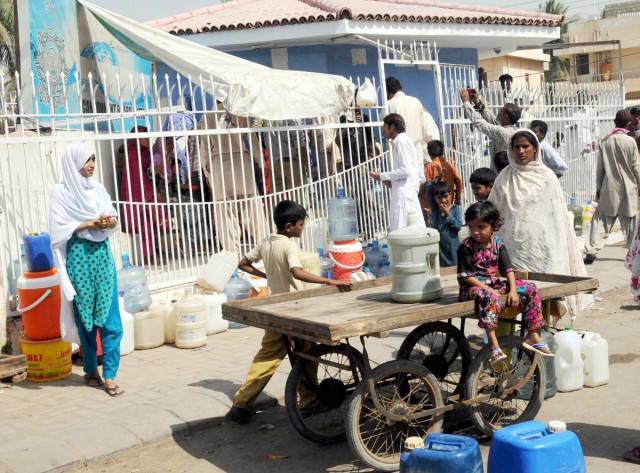Experts’ perception: Water foremost security challenge for Pakistan
Pakistan needs more storage capacity and water management agreement with Afghanistan.

The survey report covers both internal water management and trans-boundary issues. PHOTO: MOHAMMAD AZEEM/EXPRESS
Experts in Pakistan perceive water crisis as “one of the foremost security challenges” the country is confronted with. This challenge can be met by enhancing storage capacity and better management, according to a report.
The report, “Pakistan’s Water Discourse: Attitudes on Water Management Practices,” launched on Friday by the Jinnah Institute, is in fact a perception survey of 90 experts conducted as part of a region-wide research by a London-based policy institute, Chatham House.
The report presents the perceptions of the experts on the “political economy, key drivers and building blocks of the public discourse on water.”
The survey report covered both internal water management and trans-boundary issues, said Ahmad Rafay Alam, an environmental lawyer who co-wrote the Jinnah Institute’s report with Fahd Humayun, a project manager at the institute.
Alam indicated there was a “hegemonic discourse” on water in Pakistan, which has a security, technological or ideological nature often revolving around the Indo-Pak water conflict. He said this discourse crowds out other aspects of water including environmental flows and even water’s literary or cultural significance.
There were very few instances in the survey, which included in-person interviews, when respondents reached near consensus, Alam said. But he said two things all the respondents seemed to agree with were that water was at par with terrorism as a problem area for the country and that its availability was linked with Pakistan’s energy security.
Alam said the broad consensus among the experts was that Pakistan needs more storage capacity and that policies on water pricing were generally satisfactory. Respondents were divided over the Indus Water Treaty but they agreed that Pakistan needs a water management agreement with Afghanistan, Alam said.
There were missing areas in the discourse, as well. Most notably, gender, specific impact of climate change on water management, water conservation laws and social equity in water distribution.
“It is a serious concern that women and gender are not considered in water management policies,” Alam said.
Former ambassador and advocate of water conservation Shafqat Kakakhel said the report confirmed concerns about the “twin challenges of declining quantity and deteriorating quality” of water in Pakistan.
“Water is indeed an existential issue for Pakistan,” Kakakhel said, mentioning that Pakistan, much like most of the South Asian region, is “water-stressed.”
According to estimates, the per capita availability of water has decreased five times since Partition mostly due to an increase in population.
Kakakhel said there was a need for greater inter-ministerial and interprovincial coordination regarding water.
Senior research fellow of the Asia programme at Chatham House Dr Gareth Price presented a comparison of similar perception surveys done in India, Bangladesh, Nepal and Afghanistan.
Price said the shared regional challenges for water management include inter-ministerial coordination, lack of coherent vision on water and urbanization. “There is a way that (South Asian countries) can start to find mutual benefit but it is going to be a major challenge in the region,” he said.
Water expert and Aurat Foundation Chief Executive Seemi Kamal said the water discourse in Pakistan needs to be divested of its political character and dealt with in a holistic manner.
Salman Zaidi, who edited the Jinnah Institute report, said lack of reliable data was a major roadblock in the way of the development of the water discourse in Pakistan.
Published in The Express Tribune, May 10th, 2014.



















COMMENTS
Comments are moderated and generally will be posted if they are on-topic and not abusive.
For more information, please see our Comments FAQ